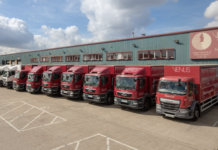Rob Mannion is the managing director and founder of RNF
At the time of writing, we are in the seventh week of Covid-19 related lockdown in the UK. The impact on the wholesale sector to date has been profound: whether it is retail wholesalers facing unprecedented demand in the face of initial stockpiling and growing consumer reliance on convenience retailers; or foodservice wholesalers shifting business models to B2C as business customers closed almost overnight, every wholesale business has had to adapt to survive.
According to latest figures from our Beam platform, this has instigated the biggest uptake in ecommerce activity ever recorded in wholesale. While lockdown restrictions will slowly be eased over time, they are not likely to be lifted completely for many months, meaning it is those wholesalers who have a digital offer that are likely to get back on their feet first.
So, if your business isn’t already set up for digital, what are the benefits and how can you make sure you’re ready to add this essential channel to your armoury?
Benefits of moving to digital wholesale
Limiting personal contact
One of the major benefits of digital wholesaling in a Covid-19 world is that ordering via apps instantly reduces the need for face-to-face contact in the depot. Orders placed via digital channels can be picked while adhering to social distancing rules and delivered to customers either through contactless delivery or click and collect services.
Payment services
As wholesalers and customers alike become increasingly reluctant to pay for goods in cash, or to risk infection by entering pin numbers into shared card machines, integrating payment facilities into mobile apps provides a quick and easy solution. In fact, this was one of the first changes we saw back in February and early March, as growing numbers of customers asked for this functionality to be added to their ordering apps.
Managing workforce sick leave
While the lockdown might be due to ease shortly, until a vaccine is found, the only way to prevent further peaks of infection is through tracking and tracing the contacts of those who become infected. This means we will still be subject to the same self-isolation and quarantine rules we have become used to over the past couple of months, putting pressure on wholesalers whose staff become ill or need to self isolate. Encouraging customers to place orders via mobile apps reduces the need for human involvement in the process, allowing customers to place and amend orders directly and at a time and place that suits them.
 Reaching new markets
Reaching new markets
With the foodservice sector in particular being stung by the closure of its customer base, we have seen many success stories whereby wholesalers have quickly refocussed their offer through the use of mobile apps. It is relatively easy to quickly direct consumers to an ordering app or website offering home delivery or contactless click and collect services, opening up potential B2C sales channels for those who were previously solely B2B.
Getting digital ready
Website and app in a single click
Fortunately, gone are the days when moving your business online and creating a mobile app took months of planning and development work and cost tens if not hundreds of thousands of pounds. Today, new technology means that once we have all the information required for your ordering app, RNF can create a fully-branded ordering app (and coordinating ecommerce website) in a single click. Time from receiving the information to delivering your app? As little as 24 hours. The cost? Free.
Product files
While the time to create apps has significantly reduced, there is still some set up work required. In order to get an app up and running for customers, we need a full product list (including pack size and pricing information), company contact information and a CSV spreadsheet exported from your ERP system to make sure everything is integrated.
Product images
Great product photography is also a key part of driving sales via mobile apps. You can either create your own library of digital images taken on a cameraphone in your depot or partner with companies such as Erudus and BrandBank.
Making the most of digital
Ensuring your digital channels are joined up
A key part of making sure the move to digital works for you and your customers is to ensure your mobile and website ordering channels synchronise. No one likes starting an order on one device only to use another to finish it and then find their basket hasn’t updated. All RNF digital solutions are designed to make sure customers have the smoothest omnichannel ordering experience possible.
Depot in your customers’ pockets
Once your ordering app is set up and your customers effectively have access to your wholesale depot in their pocket, it may sound obvious but the first step is to make sure they know about it and how to download it and register their account.
Digital promotion
Once customers have downloaded the app, you then need to encourage them to use it.
Mobile Apps have consistently been the only growth sales channel for wholesale for the past few years and, while Covid-19 is driving demand further, some customers still need a little encouragement. Setting up digital only sales events, offering digital-only products or price promotions are both easy ways of doing this. Drawing on customer data re. individual buying habits can also be used to personalise communications with customers, personalising their online experience to ensure messages aren’t viewed as spam and growing basket size by encouraging them to make the most of offers that are timely and pertinent to them.










